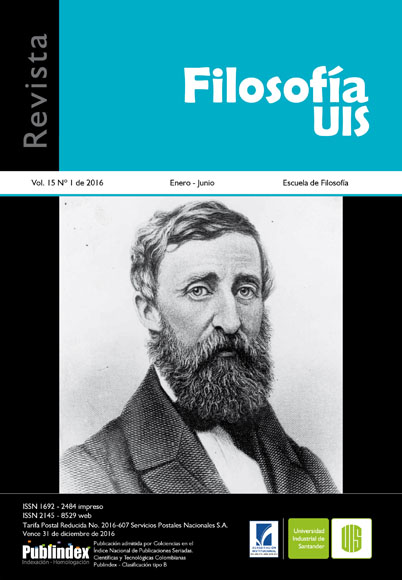Pre-texts for the Rawlsian Theory of Justice
Published 2016-06-24
Keywords
- Rawls,
- Theory of Justice,
- principles of justice,
- moral subject
How to Cite
Copyright (c) 2016 Revista Filosofía UIS

This work is licensed under a Creative Commons Attribution 4.0 International License.
Abstract
The objective was established the first concepts or the first forms before they were located substantially in John Rawls’s masterpiece: A Theory of Justice. It was the central idea in this dossier. The contractual rawlsians documents were reviewed critically and were found such concepts: “Justice as Fairness” (1958), “The Sense of Justice” (1963) y “Distributive Justice” (1973). These germinal ideas were found such as the rejection of the criterion of utility, the fist formulation of the principles of justice, the problematic of moral subject and its obligation with compliance with regulations given by the principles of justice, and finally the veil of ignorance. Perhaps themselves have rejected some criticisms of Rawls.
Downloads
References
- Agra, M. X. (1999). En torno a la justicia: las aportaciones de Aristóteles, el
- pensamiento español del XVI, J. S. Mill, la fenomenología y Rawls. Madrid: Eris.
- Agra, M. X. (2004). “Antes y después de Rawls”. Revista internacional de filosofía
- política, (23), 71-92.
- Arendt, H. (1993). La condición humana. Barcelona: Paidós.
- Arendt, H. (2006). Los orígenes del totalitarismo. Madrid: Alianza.
- Arendt, H. (2006). Sobre la violencia. Madrid, Alianza.
- Camps, V. (1996). El malestar de la vida pública. Barcelona: Grijalbo.
- Cortés, F. (1999). De la política de la libertad a la política de la igualdad: un ensayo
- sobre los límites del liberalismo. Bogotá: Siglo el hombre.
- García, D. E. (2004). La violencia como condición o como disolución de lo
- político: Carl Schmitt y Hannah Arendt. Signos Filosóficos, VI (11), 73-96.
- Grueso, I. (1997). Rawls. Una hermenéutica pragmática. Cali: Universidad del
- Valle.
- Harsanyi, J. C. (1992). Games and decision theoretic models in ethics. Paises Bajos:
- Norht Hollan.
- Kant, I. (2007). Fundamentación de la metafísica de las costumbres. San Juan de
- Puerto Rico: Pedro Rosario Barbosa.
- Kohlberg, L. (1992). Psicología del desarrollo moral. Bilbao: Desclée de Brouwer.
- Mejía, O. (1997). Justicia y democracia consensual. Bogotá: Ediciones Uniandes y
- Siglo del Hombre.
- Nozick, R. (2015). Anarquía, estado y utopía. Madrid: Innisfree.
- Rawls, J. (1958). “Justice as Fairness”. The Philosophical Review. LXVII 164-194.
- Ithaca, New York.
- Rawls, J. (1963). “The Sense of Justice”. The Philosophical Review. LXVII. 281-305
- Ithaca, New York.
- Rawls, J. (1973). “Distributive Justice”. Phelps. Economic Justice. Londres: Penguin
- Books.
- Rawls, J. (1995). Una teoría de la Justicia. México: Fondo de Cultura Económica.
- Rawls, J. (2012). Justicia como equidad. Materiales para una teoría de la justicia.
- Madrid: Técnos.
- Sartre, J. P. (2005). Un bosquejo de la teoría de las emociones. Madrid: Alianza.
- Schmitt, C. (1999a). El concepto de lo político. Madrid: Alianza.
- Schmitt, C. (1999b). La dictadura. Madrid: Alianza.
- Villoro, L. (2007). Los retos de la sociedad por venir. Ensayos sobre justicia,
- democracia y multiculturalismo. México: Fondo de Cultura Económica.
